|
Grandma's All Natural
|
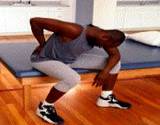 | 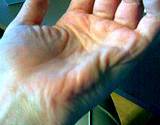 |  |
There are many different external and internal causes for muscle pain; injuries, stress, strain, disruptions in the mineral balance, including a magnesium deficiency, spinal misalignment, circulatory disorders, or rheumatic disease.
Symptoms may also surface as the result of stress or other emotional problems. Fortunately, there are many treatments for natural muscle pain relief.
The muscles are responsible for moving every part of the body. They are slightly tensed even when at rest, helping to keep the body in a static position. The strength of a muscle depends on how many muscle strands it contains.
If a muscle is stressed beyond its capability, it can become strained. Too much stress on untrained muscles or exposure to cold drafts can cause aches and pains. Injuries to muscles can manifest as tightness, cramps or sore muscles. Contusions, such as bruises, can cause muscle strains or even tears in muscle strands. Read Grandma's Guide to Back Pain Relief.
One muscle is composed of up to 2,000 muscle fibers. Each muscle fiber is 2-5 inches long.
For example: In the thigh alone you have these muscles:
- Outer (lateral) thigh muscle
- Inner (medical) thigh muscle
- Thigh flexor
- Front thigh muscle
Are you suffering from Neck Pain
or something as serious as a Herniated Disk
? Read Grandma's Guide to natural relief for these ailments.
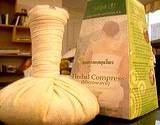 | 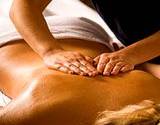 | 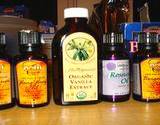 |
Natural Muscle Pain Relief
Herbal Remedies, Minerals, Teas & Exercises
Aching muscles can be relieved with hot herbal baths, massages, hot-water bottles and ice packs. Gentle muscle training, such as stretching and slight changes to diet also help. Heat applications, mineral preparations, various herbal teas and liniments have eased pain to some people, too. A combination of therapies may be necessary.
Natural Minerals
During physical exertion, the body loses minerals through perspiration. Eat dried fruits, especially apricots and bananas, to maintain high levels of potassium and to prevent muscle cramps. For magnesium, which is also important for muscular work, eat whole-grain products, nuts, potatoes and vegetables.
Rosemary Bath
Add rosemary to a bath to relieve muscle pain caused by overexertion, contusions and sprains. To prepare your own bath, you will need about 3 ounces of dried rosemary leaves. Boil them for 5 minutes in 2 quarts of water and then steep for 20 minutes. For best results, soak the injured area for 15 minutes.
Oil for Muscle Cramps
Mix 5 tablespoons of St.-John's-wort oil, 1 tablespoon of arnica oil and 1 teaspoon each of eucalyptus and rosemary oils. Gently massage the oil mixture into sore muscles after a workout. The massage will loosen muscles and improve circulation, while relaxing you at the same time.
Hot and Cold Treatments for Painful Muscles
It's best to apply cold treatments to painful muscles during the first two days after injury. Treat the aching area with cold showers or ice packs. The cold stimulates circulation and keeps swelling down. During the next two days, stimulate the aching muscles with heat treatments - such as hot baths, compresses, and hot-water-bottles. These treatments will dilate blood vessels and relax and relieve muscle pain.
Herbal Teas
- Herbal Tea for Muscle Pain - Ash leaves relieve pain in the muscle tissue. Bring 1 teaspoon of dried leaves and 1 cup of water to a brief boil; steep for 10 minutes. Strain and drink in sips.
- Tea for muscular rheumatism - Mix 2/3 ounce of birch leaves, ask leaves, nettle green parts and rest-harrow root with ½ ounce each of bean pods and rose hips. Pour 1 cup of water over 1 teaspoon of the mixture; steep 15 minutes. Drink 3 cups daily.
Exercise
- Preventing cramps in the calf - Deliberate stretching of the calf muscles can help prevent cramps. Massage the oil into the calf muscles - upward, from the bottom toward the top. Then stand 3 feet from a wall, extend our arms outward and lean against the wall for 10 second. Your heels should remain on the floor. Do not make any backward movements. Repeat the exercise 5 times.
- For acute cramps in the calf - Gentle stretching is also helpful for acute muscle cramps. Lie on your back and pull the affected leg toward you, bending your knee. Now curl your toes gently toward you, then press them away. Repeat several times. If there is no improvement, apply an ice bag to the cramped muscle.
Watch Your Diet
A diet rich in raw or juiced fruits and vegetables can help prevent inflamed muscles. Drink at least 1 quart of vegetable or fruit juice and 1 quart of herbal tea each day. Do not eat meat, hard cheeses or table salt. As the toxins are eliminated, the inflammation will disappear. Gradually add the meat, cheeses and salts back into your diet.
DISCLAIMER:
The statement's made here have not been approved by the Food and Drug Administration. These statements are not intended to diagnose, treat or cure or prevent any disease. This notice is required by the Federal Food, Drug and Cosmetic Act.
Return from Natural Muscle Pain Relief to Grandma's Ailments and Treatments Guide
Return to Grandma's Wisdom Home





